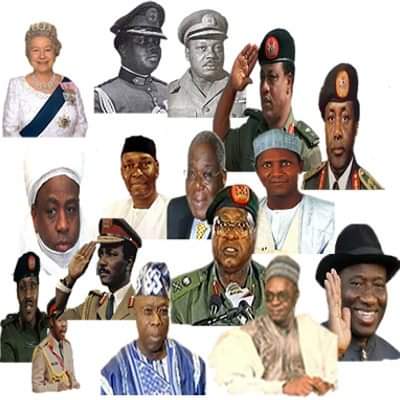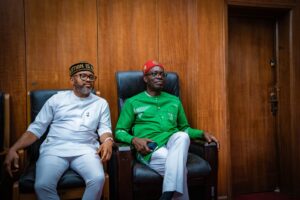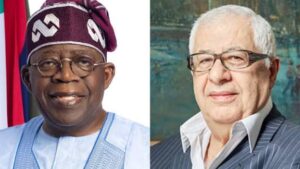
The writings and teachings of leadership theorists and scholars have over the years established that the best way to achieve the goals of an entity is to hand the entity over to a leader with vision, passion and integrity.
This probably explains why many developing countries including Nigeria believe that the only solution to their myriad of developmental challenges is leadership change.
Their position is hugely reinforced by the age-long belief that everything whose head is bad is virtually irredeemable.
Nigerians have however not bothered to identify and isolate for resolution, other causative factors to their nation’s stunted growth.
To make matters worse, it is only political leaders and perhaps some of their close aides that people are blaming.
Indeed, some even think, it is only the president that should be blamed for every failure in the country, family disagreements inclusive.
In reality, so much is happening in other areas of public affairs that is worth interrogating.
Is stinking corruption in our places of worship managed by political leaders or was it political leaders who were dispensing fake COVID 19 cards to unvaccinated citizens?
Bearing in mind that Nigerians have continued to view their country’s problems from only one perspective forgetting that doing the same thing repeatedly can hardly end with a different result, it is time to draw attention to the extent to which several groups of people in Nigeria other than those in the political leadership class have contributed to the nation’s dilemma.
There is no better time to do so than this period of political confusion that could blur strategic reasoning.
It has in fact, become necessary to make the point that although leadership is always a critical factor, it is also interestingly a dependent variable, subject to factors such as situations and followership.
Indeed, that there is a leader, presupposes that there are people – followers, with many of them constantly unwilling to follow the acclaimed leader; opposing leadership on every subject just for the sake of doing so.
And as history has shown, many leaders fail or succeed only because of the situation they find themselves.
Another wrong notion of leadership is that it can only be located at the apex of an entity’s hierarchy. This is wrong because there is leadership at all levels.
In a typical democracy, the executive, the legislature and the judiciary have different leaders.
At the federal, state and local governments levels, there are separate leaders.
In the public sector, ministries, departments and agencies have distinct leaders, so do directorates, divisions, sections and units.
In truth, messengers, cleaners, typists etc. have their own leaders making it obvious that the concept of leadership is applicable to a large number of people whose activities are usually discountenanced.
While citizens in developed economies keep to the established norms of performing their functions diligently without prompting, operatives in Nigeria do not really work well enough to deserve any pay.
Why does a people need to be pleaded with to not use impatience to create congestion at every junction of our roads which keep themselves stranded all the time?
Based on greed and a general inclination to profiteer, members of the Nigerian civil society have over the years assisted political leaders to destroy the country.
I remember the case of an operative in a government agency who told a disciplinary panel that he declared a brand new vehicle unserviceable so it could be sold to his chief executive.
He claimed to have done so because the boss promised to put him in charge of the sale of all the agency’s unserviceable vehicles across the country.
In several public offices, many operatives claim huge overtime allowances though they hardly work for as much as the prescribed 8 hours a day.
It is only supervisors who approve such illegal claims that are popular in different public organizations in Nigeria.
But should such supervisors and their fraudulent staff blame leadership over the poor state of finances in the country?
Surprisingly, they do and very loudly too, heaping blame on the proverbial leadership that must be changed.
But then, would any improvement be recorded if bad leaders are changed while fraudulent operatives are left to sustain the ‘business-as-usual’ posture to the detriment of the nation?
Another observable problem is the ease with which Nigerians support policies they do not understand.
For example, after the civil war, everything in Nigeria was federalized under the guise of furthering national unity.
Intellectuals and eloquent activists supported the move thereby helping the military to seamlessly conclude the subject.
Today, everyone who wants restructuring, another name for decentralization is blaming leadership for the emergence of our previously preferred almighty federal government.
State police that we are agitating for now was loathed then because the regional leaders used them to persecute their opponents.
Today, those enjoying the bogus federal police are not willing to let go because they are useful for rigging elections.
If only we had critically examined the changes we made then, we could have moderated our support for putting every subject in the exclusive legislative list.
We assumed that the parliamentary system of government was our problem, so we quickly adopted the presidential system.
Now, how do we get out of the expensive bicameral legislature whose members collude to produce an annual fraudulent budget?
The vocal elites are not only still actively around but have developed expertise in blowing cosmetic issues out of proportion while leaving substance to pursue shadows.
Last week, when former president Olusegun Obasanjo announced his support for a particular candidate in the forthcoming presidential election, many people cried foul as if the man has no right to determine his preference on the subject.
Some have aggressively argued that Obasanjo having had his time in government should not dabble into the current electioneering process.
They refer specifically to how other former leaders stay quiet and dignified. The critics got it all wrong. First, the fact that certain former leaders are quiet does not mean they are impartial.
Apart from the fact that each leader is entitled to his mannerism and chosen disposition, nothing suggests that those who are quiet love Nigeria more.
But perhaps the most irritating aspect of the attack on Obasanjo is the fact that because many Nigerians never want to be in the bad books of those in government, they say nothing at the right time thereby rendering our democracy impotent.
Is it Obasanjo whose tenure ended 16 years ago that we should be holding accountable now?
Every day, ordinary Nigerians who support the present administration are falling on each other publicizing what they call the gigantic achievements of president Buhari. Why not let us feel the achievements ourselves?
After May 29th and especially if another party forms the next government we shall begin to hear the same people loudly condemning what they will call the atrocities of the former government.
If as it is said everywhere democracy is about people, Nigerians should make their preferences about policies and leaders known as and when due.
But if as we did in the past, we are going to vote for the highest spender as the legendary Afe Babalola recently predicted, we should be honest enough to keep shut when an incompetent government emerges.
We must put an end to our old practice of ‘wisdom-after-event’ in which we begin to apologize for supposedly being misled in our decision making. Luckily, we are currently at a strategic junction of history, where we must reject the failing-signs of yesteryears.
Nigeria’s next president ought to be a person with a strong character that can rescue our dying nation. In other words, the personality should matter more than the sponsoring political party.
Our next president must be one who would in real terms win by lawful majority of votes cast in authorized voting centres; and must be prepared to serve as president of Nigeria and not that of his political party.
Our next president must employ the best hands for every job from all over the country.
Along with the next president, Nigerians must resolve to stop the blame-game and take appropriate steps to build strong institutions that can help the nation to survive over time.
FOR ADVERT, POLITICAL CAMPAIGN ONLINE BANNER & POSTER DISPLAY, EVENT COVERAGE, SPONSORED ARTICLE/STORY PUBLICATION, PR AND OTHER MEDIA SERVICES:
PLEASE, SEND AN EMAIL TO : citizennewsng@gmail.com












